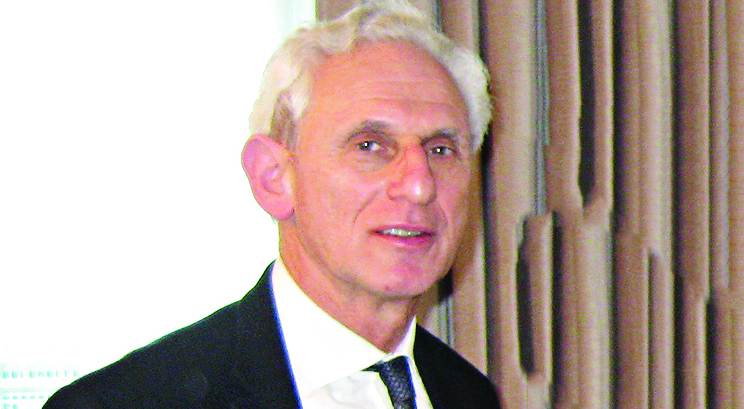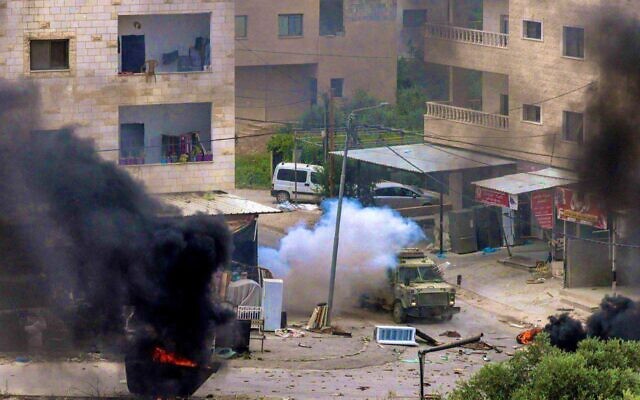OPINION: Calm amid the frenzy, but will anyone listen?
Amid the spectacle and instant gratification of 24-hour news, only a few journalists offer sensible analysis. But are viewers willing to stop and hear it, asks Alex Brummer.
Alex Brummer is a Jewish News columnist and the City Editor, Daily Mail
The adrenalin rush which drives reporters into war zones and danger and escape from duller home assignments is a feature of the international scene.
As a former foreign correspondent, I covered America’s invasion of Grenada, blood-stained revolution in Haiti and the IDF’s withdrawal from West Bank towns after Oslo.
The urge to be on the scene and file a dramatic report is always there.
The age of 24-hour television news journalism, video streaming, podcasting and social media speeds the news cycle and demands for fresh material. In the rush to instant judgment and the demand for original, even ghoulish, footage, analysis and context is often lost. Even experienced veterans like the BBC’s Jeremy Bowen can find themselves drawn in.

A few weeks ago, Bowen was reporting on atrocities and wanton destruction in Vladimir Putin’s war in Ukraine. As the Israeli military incursion into Jenin flared early this month, Bowen was swiftly on the scene trying to give some context to the drama.
Allegedly one-sided BBC reporting including a claim based on Palestinian sources of a massacre, which angered Israel’s supporters, needed calming.
TV bulletins rarely provide context – it’s about spectacle. Predictions of a lengthy Israeli Jenin incursion, as in 2002, proved wrong. Bowen provided political background, seeking to explain the muscle rippling of the Israeli right driven by Itmar Ben-Gvir and the impotence of Mahmoud Abbas and the West Bank Palestinian leadership.
But what the viewer saw, in what the Financial Ttimes called the ‘West Bank Tinderbox’ were narrow streets ploughed by bulldozers, mangled burnt-out vehicles and a macabre funeral ceremony for Palestinian fighters on the streets of Jenin amid a cacophony of gunfire.
That will be the lasting image – the pick-up truck ramming and stabbing of pedestrians by a terrorist in busy Tel Aviv was barely noted.

Anyone wanting to understand better what has been happening in the West Bank this year, where the UN reports 114 Palestinian and 16 Israeli deaths, might be advised to tune into BBC iPlayer, where a cool analysis was offered by the journalist David Aaronovitch on the Radio 4 programme The Briefing Room.
It sought to strip away the drama and assess what is happening on the ground in Jenin in the broader context of the region and the blowing-up of the Oslo accords of two decades ago. No condemnation, just sensible analysis.
It went like this: Benjamin Netanyahu is on the ropes and this has allowed the Far Right to dictate the narrative in the disputed territories with its encouragement of settler ‘pogroms’ and renewed building.
The Jenin refugee camp had become host to young militants from Hamas, the Jenin Brigade, Islamic Jihad and rejectionist groups who have contempt for the PA as well as for the IDF. The built-up enclave offers shelter for an armed struggle by those who deny Israel’s right to exist.
Thrown into the mix are the Abraham Accords and Netanyahu’s efforts to bring Saudi Arabia under the umbrella. Deals with the Gulf countries and Morocco have locked the West Bank Palestinians and Hamas and Gaza out of the diplomatic arena.
The Briefing Room suggestion was that the price of bringing in Saudi Arabia might be a return to a peace process which could lead to a two-state solution.
It was also pointed out a one-state solution, giving Palestinians full rights in a unitary state, has growing support.
The programme gave facts and authoritative opinions which reached beyond the numbers game and the trauma of funeral processions.
But was anyone really listening?

Thank you for helping to make Jewish News the leading source of news and opinion for the UK Jewish community. Today we're asking for your invaluable help to continue putting our community first in everything we do.
For as little as £5 a month you can help sustain the vital work we do in celebrating and standing up for Jewish life in Britain.
Jewish News holds our community together and keeps us connected. Like a synagogue, it’s where people turn to feel part of something bigger. It also proudly shows the rest of Britain the vibrancy and rich culture of modern Jewish life.
You can make a quick and easy one-off or monthly contribution of £5, £10, £20 or any other sum you’re comfortable with.
100% of your donation will help us continue celebrating our community, in all its dynamic diversity...
Engaging
Being a community platform means so much more than producing a newspaper and website. One of our proudest roles is media partnering with our invaluable charities to amplify the outstanding work they do to help us all.
Celebrating
There’s no shortage of oys in the world but Jewish News takes every opportunity to celebrate the joys too, through projects like Night of Heroes, 40 Under 40 and other compelling countdowns that make the community kvell with pride.
Pioneering
In the first collaboration between media outlets from different faiths, Jewish News worked with British Muslim TV and Church Times to produce a list of young activists leading the way on interfaith understanding.
Campaigning
Royal Mail issued a stamp honouring Holocaust hero Sir Nicholas Winton after a Jewish News campaign attracted more than 100,000 backers. Jewish Newsalso produces special editions of the paper highlighting pressing issues including mental health and Holocaust remembrance.
Easy access
In an age when news is readily accessible, Jewish News provides high-quality content free online and offline, removing any financial barriers to connecting people.
Voice of our community to wider society
The Jewish News team regularly appears on TV, radio and on the pages of the national press to comment on stories about the Jewish community. Easy access to the paper on the streets of London also means Jewish News provides an invaluable window into the community for the country at large.
We hope you agree all this is worth preserving.






















